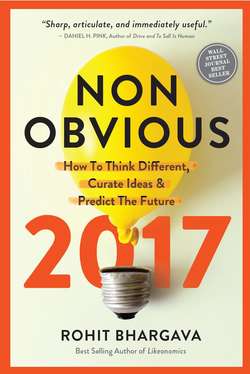Читать книгу Non-Obvious 2017 Edition - Рохит Бхаргава - Страница 24
На сайте Литреса книга снята с продажи.
2
The Curator’s Mindset:
Learning the 5 Essential Habits of Trend Curators
Оглавление“YOU NEVER LEARN ANYTHING BY LISTENING TO YOURSELF SPEAK.”
—SIR RICHARD BRANSON,
Entrepreneur and Founder of the Virgin Group
In 2006, renowned Stanford psychology professor Carol Dweck wrote a book about an idea so simple it hardly seemed worth mentioning—much less devoting an entire book to exploring.
Across decades of research into motivation, achievement and success, Dweck had come upon a beautifully elegant idea to describe why some people succeeded while others failed: it all came down to mindsets.
After conducting experiments with grade school students, interviewing professional athletes and studying business leaders, Dweck proposed that most people had one of two types of mindsets: a fixed mindset or a growth mindset.
People with fixed mindsets, Dweck argued, believe that their skills and abilities are set. They see themselves as either being either good at something or not good at something, and therefore tend to focus their efforts on tasks and in careers where they feel they have a natural ability.
People with growth mindsets believe that success and achievement are the result of hard work and determination. They see their own (and others’) true potential as something to be defined through effort. As a result, they thrive on challenges and often have a passion for learning.
It likely won’t surprise you to learn that I believe in the power of the growth mindset and aspire to always maintain one for myself. When it comes to learning to predict the future, it is important to adopt that same mindset for yourself.
The beautiful thing about mindsets is that we all have the ability to change ours—we just need to make the choice to do it.
Seeing trends, like playing an instrument or being more observant, are skills within your grasp to learn and practice. Does this mean you can transform yourself into a professional flamenco guitarist or a full-time trend forecaster with enough practice? Not necessarily. Aptitude and natural talent do play an important part in succeeding at anything on a professional level.
As soon as children become able to evaluate themselves, some of them become afraid of challenges. They become afraid of not being smart. I have studied thousands of people … and it’s breathtaking how many reject an opportunity to learn.
—Carol Dweck (from Mindset)
Still, my work with thousands of executives and students at all levels of their careers has proved to me that the skills required for trend curation can be learned and practiced. When you learn them, they can inform your own view of the world and power your own future success.
Beyond adopting the growth mindset and having a willingness to learn, there are five core habits that will help you develop your trend-
curation abilities. Let’s explore them by starting with a story of the most famous art collector most people had never heard of—until he passed away a few years ago.
